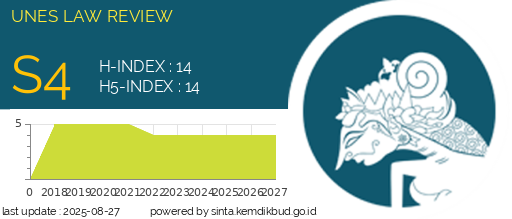Tanggung Jawab Hukum Pengembang Properti Yang Dinyatakan Pailit Terhadap Pemenuhan Kewajiban Kepada Konsumen Ditinjau Dari Teori Kepastian Hukum
DOI:
https://doi.org/10.31933/unesrev.v6i4.2046Keywords:
Developer Company, Bankruptcy, Legal CertaintyAbstract
The need for adequate housing is a mandate of the Constitution. This is what encourages the growth of the house development industry and ready-to-live buildings in Indonesia. However, in its implementation, the community is often faced with the problem of developer companies being declared bankrupt, causing legal uncertainty for consumers. This is what makes researchers interested in examining these legal issues. This research uses normative juridical research with a statutory approach through secondary data searches. The result of this research is that when the developer enters PKPU and is even declared bankrupt, it is the consumers who suffer great losses. Because, if the developer is declared bankrupt and the Deed of Sale and Purchase (AJB) has not yet belonged to the consumer, the consumer's assets will also be confiscated and auctioned, and the consumer does not necessarily get a share of the proceeds from the auction because it is not certain that the results are sufficient to pay off his share. In this case, it can be seen that in bankruptcy cases, consumers are the most vulnerable. In the absence of AJB in addition to being the last creditor, the consumer is not the owner of the land and the land will be auctioned and divided by the separatist creditor. There needs to be an effort from the government to form a specific regulation governing further provisions and the position of creditors in bankruptcy, PPJB, reservation agreements, Pre-Project Selling obligations of developers, as well as sanctions if it is found that the development company has defaulted or broken promises. Because the Bankruptcy Law and GCPL have different solutions from each other, it is necessary to have clearer arrangements between bankruptcy and consumer protection to create legal certainty.
Downloads
References
Risquanty, C. D. (2022). Akibat Hukum Kepailitan Bagi Pengcmbang Terhadap Pembeli Konsumen) Satuan Rumah Susun ( Apartemen ). Sournal Education and Development, 10(3).
Saputri, E. M. (2019). Perlindungan Hukum Terhadap Konsumen dalam Hal Devcloper Apartemen Dinyatakan Pailit. Jurnal Hukun Bisnis Bonum Commune, 2(2), 151-161.
Giovana, N. P. T. (2019). Komitmen Tetap Perjanjian Jual Beli (PPJB) di Unit Pembelian Rumah Susun Sebagai Perlindungan Hukum Bagi Konsumen. Substansive Justice Jurnal Hukum Internasional, 2(1), 21-30.
Reinaldo, E. (2022). Aspek Hukum Dalam Pembuatan Akta Jual Beli Kos Dan Kuasa Jual. Jurnal Wacana Hukum Dan Sains, 18(1)
Salim HS dan Erlies Septiana Nurbani, Penerapan Teori Hukum Pada Penelitian Tesis Dan Disertasi, (Jakarta: Raja Grafindo Persada, 2013).
Susanti Adi Nugroho, Hukum Kepailitan di Indonesia (Dalam Teori dan Praktik Serta Penerapan Hukumnya), (Jakarta: Prenada Media, 2018).
Shidarta, Hukum Perlindungan Konsumen Indonesia, Cetakan ke-3, Edisi Revisi II, (Jakarta: Grasindo, 2000).
Heri Hartanto, “Perlindungan Hak Konsumen Terhadap Pelaku Usaha Yang Dinyatakan Pailit”, Jurnal Adhaper Vol. 2, (2016).
Anthonius Karianga, “Analisis Konsumen Terhadap Perusahaan yang Dinyatakan Pailit Oleh Hakim Pengadilan Niaga”, Lex Administratum Vol. 5, No. 7, (2017).
Downloads
Published
How to Cite
Issue
Section
License
Hak cipta :
Penulis yang mempublikasikan manuskripnya di jurnal ini menyetujui ketentuan berikut:
- Hak cipta pada setiap artikel adalah milik penulis.
- Penulis mengakui bahwa UNES Law Review berhak menjadi yang pertama menerbitkan dengan lisensi Creative Commons Attribution 4.0 International (Attribution 4.0 International CC BY 4.0) .
- Penulis dapat mengirimkan artikel secara terpisah, mengatur distribusi non-eksklusif manuskrip yang telah diterbitkan dalam jurnal ini ke versi lain (misalnya, dikirim ke repositori institusi penulis, publikasi ke dalam buku, dll.), dengan mengakui bahwa manuskrip telah diterbitkan pertama kali di Jurnal UNES Law Review.



















